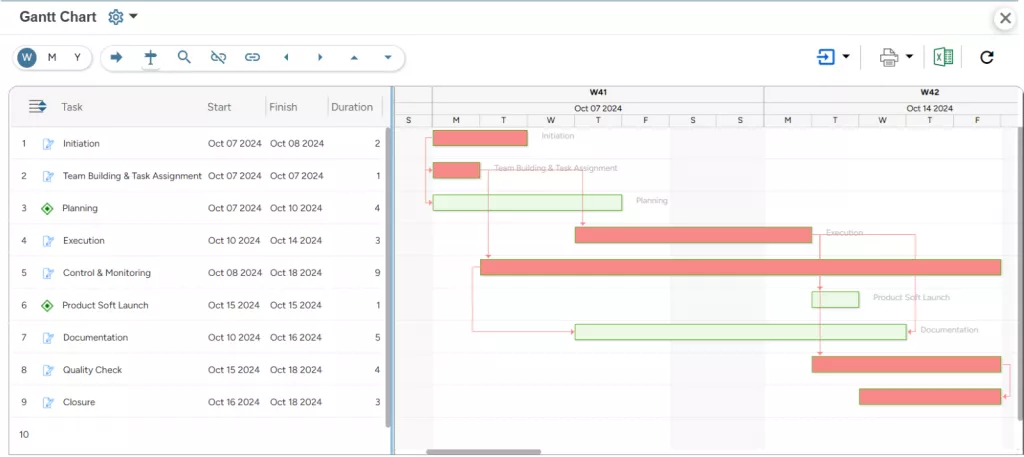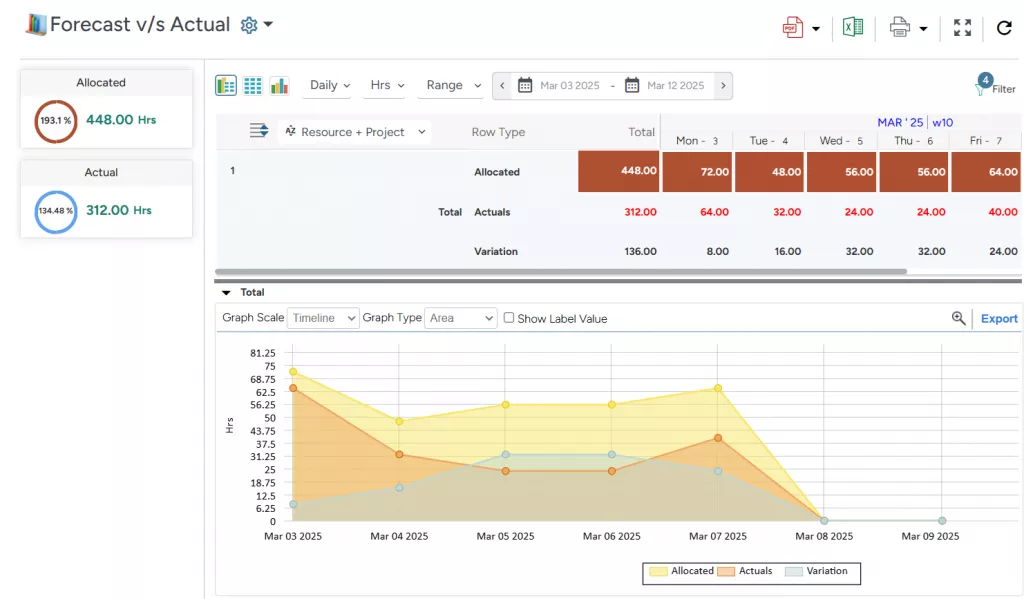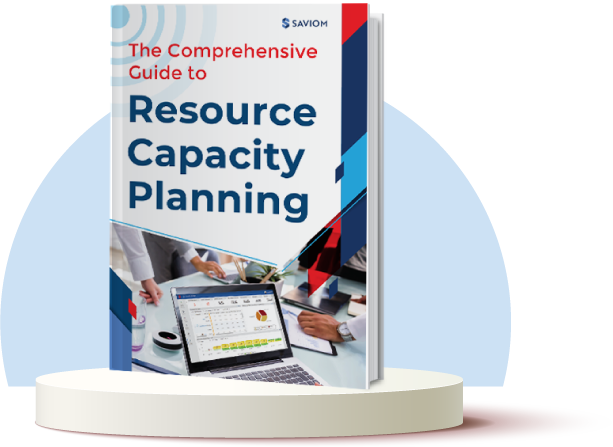We all have heard the famous adage, “Time is money.” While it applies to almost every sphere of life in some way or another, it is especially true in the business world, where effective time management can make or break a company’s success.
In a project-based organization, completing every project on time is vital for winning the client’s trust and safeguarding their reputation in a competitive market. This responsibility often falls on project managers, who must implement effective strategies and leverage the right tools to overcome time management challenges and ensure projects are delivered successfully.
In this blog, we will dive into the fundamentals of time management, and the best practices managers can follow to keep projects on track.
But let’s first discuss what time management is.
What is Time Management?
Time management is the process of managing the time spent on a project to ensure it adheres to its predefined deadline. It involves planning, scheduling, tracking, and managing all the project’s activities from start to end to minimize bottlenecks and prevent delays.
For effective time management, project managers must set definitive timeframes for individual tasks and keep resources informed of their deadlines. Moreover, they must develop appropriate contingency plans to effectively address unforeseen circumstances and reduce their impact on the project timeline.
Now that you’ve understood what time management is let’s explore the various techniques employees can utilize to manage time.
Time Management Techniques
Project managers can employ well-established time management techniques to boost team productivity and ensure deadlines are met efficiently. Here’s a rundown of the most commonly used methods:
Pomodoro Method
The Pomodoro Technique, developed by Francesco Cirillo, is a time management method that divides work into 25-minute intervals, known as “pomodoros,” followed by short 5-minute breaks. After completing four such cycles, one is recommended to take a more extended break of 20 minutes. This structured approach enhances concentration, minimizes distractions, reduces stress, and provides a practical way to optimize time spent on tasks.
Eat the Frog
“Eat a live frog the first thing in the morning, and nothing worse will happen to you the rest of the day.” ~ Mark Twain
This well-known quote is the inspiration behind the Frog technique. It emphasizes tackling the most significant or challenging tasks—your “frogs”—at the start of the day. The rationale behind this technique is that by addressing difficult tasks early, individuals can combat procrastination, reduce mental stress, and create momentum for efficiently handling responsibilities throughout the day.
Get Things Done (GTD)
GTD, developed by David Allen, is a popular time management system that involves a 5-step method to organize tasks and responsibilities. These steps include capturing everything that needs attention, clarifying their purpose, organizing them into specific categories, reviewing them regularly, and executing them. This technique helps individuals break down complex work into manageable components and stay on top of their commitments with greater ease and efficiency.
Eisenhower Matrix
The Eisenhower Matrix, created by Dwight D. Eisenhower, is a time management tool emphasizing task prioritization based on urgency and importance. The four-quadrant matrix classifies work into ‘Important and Urgent,’ ‘Important but Not Urgent,’ ‘Urgent but Not important,’ and ‘Not Important and Not Urgent.’ This distinction helps professionals focus on what truly matters while reducing time wasted on low-priority activities.
Time Blocking
Time blocking is a productivity technique that involves creating specific blocks of time for tasks or activities throughout the day. In this method, individuals assign time slots to each task rather than creating a general to-do list. This creates a clear plan for the day, making it easier to stay organized and maintain high productivity. Moreover, time blocking reduces the risk of multitasking, enhances concentration, and ensures that important tasks are given adequate time and attention.
Timeboxing
Timeboxing is a goal-oriented strategy that involves allocating a fixed time limit (timeboxes) to activities and completing the task within that timeframe. If the timebox expires and the task is incomplete, one can determine if more time is needed or if moving on to the next task is better. This technique enhances focus, sets clear boundaries for each task, and helps complete the work on schedule.
Pareto Principle
The Pareto Principle, often referred to as the 80/20 rule, is a concept that suggests that roughly 80% of outcomes result from 20% of efforts or inputs. It was developed by economist Vilfredo Pareto, who observed that 80% of Italy’s land was owned by only 20% of the population. This technique encourages individuals to focus on the most impactful factors to maximize efficiency and yield the desired results, reducing distractions.
Rapid Planning Method (RPM)
The Rapid Planning Method (RPM), developed by Tony Robbins, is a results-oriented time management technique. It focuses on three core components: defining the desired outcome (Result), understanding the underlying purpose (Purpose), and establishing a clear, actionable plan to achieve the goal (Massive Action Plan). This approach enables individuals to stay motivated and achieve tangible results.
Read More: What is Workload Management, and How can it Boost Business Efficiency?
Now, let’s jump onto the next section, underlying the significance of time management.
Why is Time Management Important?
According to PMI, “time management is one of the six critical functions of project management.”
Every project has an official end date; adhering to this deadline is crucial for successful delivery. Managing time efficiently enables project managers to ensure task completion and meet stipulated deadlines. Therefore, it plays a critical role in driving project success rates.
Proper time management allows managers to prioritize critical, high-priority tasks and utilize resources optimally to meet project goals and objectives. It helps them improve productivity, deliver high-quality outcomes, and prevent project delays. Moreover, by ensuring seamless project execution, managers can enhance stakeholder satisfaction and boost organizational reputation.
Effective time management also plays a significant role in mitigating risks and handling unexpected challenges. Projects often encounter changes or obstacles, and a well-managed timeline provides the flexibility to address these issues without derailing progress. By planning ahead, project managers can prevent bottlenecks, coordinate team efforts effectively, and ensure that deliverables meet client expectations.
Read More: 9 Effective Tips on Enhancing Employee Performance at Work
Now that you understand the importance of time management, let’s learn about the key challenges of managing time.
5 Time Management Challenges in Projects
When it comes to increasing productivity, overcoming common time management challenges is vital. Here’s a list of a few time barriers that can hinder project workflow:
Difficulty in Establishing Practical Deadlines
Setting realistic deadlines is a common challenge in project management. It requires a clear understanding of the project’s scope, resource availability, and potential risks, which can be tricky to navigate. If deadlines are tight, the team may rush and make mistakes, whereas overly long timelines can lead to resource underutilization and delayed progress.
Inadequate Handling of Scope Changes
Sudden scope changes can significantly disrupt the project workflow. When new requests arise unexpectedly, project teams often struggle to accommodate the changes while handling existing tasks within the original timeframe. This, in turn, results in delayed deadlines and poor-quality work.
Read More: What is Scope Creep, and How to Avoid it in Project Management?
Ineffective Prioritization of Tasks
Without a structured prioritization framework, it becomes difficult for project managers to categorize tasks based on value and urgency. This poor prioritization often leads to teams spending more time on less important tasks while neglecting the critical ones. Consequently, it creates a ripple effect that hinders productivity, causes schedule overruns, and leads to client dissatisfaction.
Delays Due to Procrastination
Procrastination causes tasks to pile up, leaving little time to complete them. It often stems from a lack of motivation, fear of failure, or being overwhelmed by the complexity of a task. When tasks are delayed until the last minute, team members are forced to rush, increasing the likelihood of making mistakes. This domino effect lowers the quality of deliverables and negatively affects project timelines.
Inability to Minimize Distractions
Distractions in the workplace, such as frequent emails, unplanned meetings, and noisy surroundings, can significantly impede time management. These interruptions disrupt focus, break workflow, and cause employees to lose valuable time as they try to regain concentration. When interruptions become frequent, they lead to reduced employee productivity, which ultimately hampers project performance.
Now that you’re aware of the key challenges, let’s explore the various time management strategies to handle them.
Read More: 10 Effective Ways to Increase Employee Productivity in the Workplace
Time Management Strategies to Ensure Successful Project Delivery
Time can be effectively managed with good management skills and strategies. Here are a few tips that signify how to get better at time management and drive rewarding project results:
Set Clear Project Goals & Priorities
To manage time effectively, it is essential to begin with actionable goals and clear priorities. For this, project managers can establish SMART objectives (Specific, Measurable, Achievable, Relevant, and Time-bound) to ensure all stakeholders are aligned and focused on what truly matters.
Moreover, managers can use techniques like the Eisenhower Matrix to prioritize project activities based on urgency and importance. This categorization enables them to allocate business resources effectively and make data-driven decisions. Furthermore, when teams understand the objectives and priorities, they can focus their energy on high-impact work and minimize distractions.
Divide the Project into Manageable Tasks
Large projects can feel daunting, making it difficult for teams to determine where to start. In such a scenario, breaking the project into smaller, manageable tasks using visual tools like the Work Breakdown Structure (WBS) simplifies the process.
This logical decomposition allows teams to focus on completing tasks incrementally, reducing the likelihood of errors or delays. Moreover, WBS makes it easier for project managers to monitor and manage smaller tasks and ensure every member works productively towards achieving their targets.
Read More: Effective Ways to Create a Work Breakdown Structure
Set Realistic Deadlines, Milestones, and Task Dependencies
Realistic deadlines are essential for effective time management, as they help ensure team members are neither overburdened nor underutilized. So, managers must leverage advanced forecasting techniques and lesson-learned reports of past similar projects to estimate the project timeline accurately.
Once that’s done, they can set milestones for every project phase and use them as a checkpoint for tracking progress. Similarly, they can establish task dependencies to understand the sequence of activities critical to meeting deadlines. Subsequently, when the team has clarity about the project milestones, dependencies, and deadlines, they can better manage their time and work together to accomplish the deliverables.

SAVIOM’s Gantt Chart allows users to view project milestones and identify task dependencies & deadlines with ease.
Deploy Resources to Tasks Based on Skills & Interests
Once deadlines and milestones are established, the next step includes deploying resources to tasks. Before allocating resources to different project tasks, assessing their skills, qualifications, and interests is imperative. Matching tasks with individuals’ strengths boosts motivation, improves productivity, and ensures high-quality output.
Managers can utilize next-gen resource management software to streamline the allocation process. Its comprehensive suite of features enables them to allocate the best-fit professionals to suitable projects. Furthermore, the tool provides a real-time skill inventory to track and record resource competencies.
Read More: What is Resource Management? A Comprehensive Guide
Delegate and Outsource Work Effectively
Delegation is critical for optimizing team efficiency and project performance. By carefully matching tasks to resources’ skills and capacity, project managers can balance workloads, ensure timely task completion, and maximize collective productivity. This way, they can prevent employee burnout while leveraging each team member’s core competencies.
On the other hand, outsourcing provides access to expert skills without long-term employment commitments. Moreover, it relieves experienced resources of the burden of performing non-critical tasks and gives them more time to focus on high-priority and complex tasks.
Develop a Contingency Plan to Accommodate Delays or Scope Changes
Despite thoroughly following a project plan, unexpected issues can derail the timeline. These issues might include unplanned absences, sudden attrition, or changes in client requirements. That’s why it’s crucial to have a solid backup plan in place.
With a proper contingency plan, managers can quickly respond to unforeseen challenges without affecting the project workflow. For example, suppose a key resource becomes unavailable at the last moment. In that case, an effective backup plan ensures that a qualified replacement is ready to step in, keeping the project on track.
Read More: What is a Project Scope Document, and How to Create an Effective One?
Monitor Project Progress Regularly
Keeping a tab on how the project is progressing is critical for successful delivery. Real-time task tracking helps ensure the project progresses per the original plan and gives insights into the potential issues that can cause significant disruptions later.
Moreover, it enables project managers to take corrective measures to mitigate risks before they become serious issues. They must pay special attention to the tasks in the critical path as they have a direct implication on the overall timeline. However, project managers can go a little easier on slack tasks depending on the allowable buffer.
Ensure Effective Team Communication and Collaboration
A survey by The Economist revealed that, “44% of participants identify ineffective communication as a key factor contributing to project failure.”
This figure underlines the importance of having good communication between teams and departments for the project’s timely completion. Therefore, it’s crucial for managers to maintain effective communication at every level. When team members communicate effectively, it reduces misunderstandings and confusion and prevents unnecessary delays.
Moreover, conducting regular team meetings, providing clear updates, and ensuring open discussions help everyone stay on the same page. That’s why managers must openly communicate every member’s role and responsibility, so they move ahead smoothly. This continuous communication helps build a sense of duty and drives resources to work responsibly to achieve on-time project completion.
Read More: 10 Ways to Improve Cross-Departmental Collaboration
Use Time Tracking Tools
Lastly, leveraging an efficient time-tracking tool is essential to monitor the time spent on various tasks within a project. These tools provide integrated timesheets that allow team members to record their daily activities. Depending on your specific project needs, these log entries can be configured for approval by project managers, supervisors, or stakeholders.
Moreover, these advanced solutions provide in-depth insights into planned vs. actual time spent, helping managers improve time estimation accuracy for current and future projects. By analyzing this data, project managers can spot variances and, accordingly, take corrective actions.

SAVIOM’s Forecast vs. Actual Time Report provides users with in-depth, actionable insights for better time management and higher workforce productivity.
Below are some bonus tips for effectively managing time and ensuring project success.
Takeaways: Time Management Tips
Time management is one of the cornerstones of a successful project. It involves complete control over the time you spend on every task throughout a project. With the above-cited time management strategies, you can efficiently optimize the scheduling, allocation, and execution of a project’s tasks in a time-efficient manner.
Additionally, if you’re looking for quick ways to manage time, the following are a few excellent time management tips to get started:
- Ensure there is ample lead time for resource onboarding to allow adequate preparation and alignment with project requirements.
- Minimize distractions, interruptions, and multitasking to maintain a focused work environment.
- Encourage team members to take breaks between tasks to recharge and sustain productivity.
- Eliminate non-essential tasks and allow the team to concentrate on high-priority activities contributing to project goals.
- Foster work-life balance to help team members stay stress-free, motivated, and energized. It will enhance their overall performance.
The Glossary
Read More: Glossary of Resource Workforce Planning, Scheduling and Management












